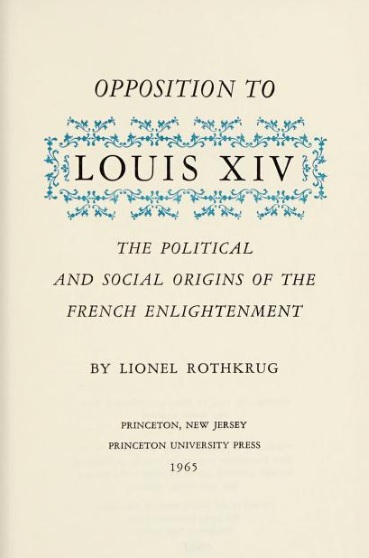Biblioteca / 1960-1969
Lionel Rothkrug. Opposition to Louis XIV. The Political and Social Origins of the French Enlightenment.
Princeton: Princeton University Press, 1965. Reimpresión, 2015. xv, 533 páginas.
CONTENTS
Preface
Part I
Prelude to Reform 1576-1683
Introduction to Part I
Chapter I. Intellectual Backgrounds of Reform Movement
1 – Mercantilist and anti-mercantilist views in sixteenth century France
2 – The origins of religiously inspired opposition to mercantilism
3 – Humanist sources of opposition to mercantilism
Chapter II. Mercantilist Theory and Expres sions of Early Aristocratic Protest
1 – Mercantilism: economic theory, state organization and political philosophy
2 – Jean de Lartigue and aristocratic dissent
Chapter III. Administrative Growth and Rural Government: Fiscal Reform 1648-1683
1 – The problem of fiscal reform
2 – Projects for fiscal reform 1648-1684
3 – External influences on the develop ment of fiscal thought 1660-1684
Part II
The Movement for Reform 1684-1700
Introduction to Part II
Chapter IV. From Remonstrance to Protest: The Rise of Opposition 1642-1689
1 – Merchant complaints about mercantil ist policies prior to Colbert
2 – The affaire Foucquet: the spread of criticism and the joining of issues
3 – Colbert’s death: the rise of opposition and the demand for reform 1684-1689
Chapter V. The Origins and Development of Christian Agrarianism 1684-1697
1 – The report of 1687
2 – Claude Fleury: early agrarian concepts
3 – The memoir of 1688: Fenelon, Christian agrarianism, and political conspiracy
4 – The Quietist Controversy: another dimension to reform
Chapter VI. Secular Reform: Utilitarian Philosophy and Agrarian Theory
1 – Early utilitarian philosophy
2 – Belesbat: anti-mercantilist theory and the principles of utility
3 – The merger of fiscal reform with agrarian theory and the economics of utilitarian philosophy 1688-1695
Chapter VII. New Dimensions to Reform
1 – Crown-merchant relations and govern ment reaction to reform 1689-1695
2 – Merchant ascendancy and the growth of public opinion 1695-1700
3 – Reform at its height: the clash of ideologies and the decline of authority 1695-1700
Conclusion
Bibliography
